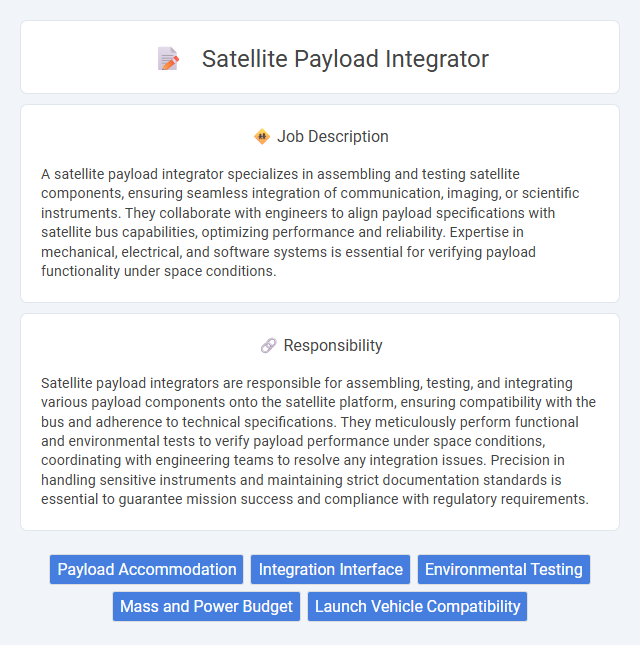
A satellite payload integrator specializes in assembling and testing satellite components, ensuring seamless integration of communication, imaging, or scientific instruments. They collaborate with engineers to align payload specifications with satellite bus capabilities, optimizing performance and reliability. Expertise in mechanical, electrical, and software systems is essential for verifying payload functionality under space conditions.
Individuals with strong technical skills and attention to detail are likely to be well-suited for a satellite payload integrator role, as the job involves precise assembly and testing of sensitive equipment. Candidates who thrive under pressure and can maintain focus in high-stakes environments may find this career a good match. Those with a propensity for teamwork and clear communication could also have a higher probability of success in this specialized field.
Qualification
A Satellite payload integrator must possess a strong background in aerospace engineering, electrical engineering, or a related technical field, typically requiring a bachelor's degree and hands-on experience in satellite systems integration. Proficiency in testing and validating payload instruments, familiarity with space environment conditions, and knowledge of industry standards such as ECSS or NASA protocols are essential qualifications. Strong problem-solving skills, attention to detail, and the ability to collaborate within multidisciplinary teams significantly enhance effectiveness in this role.
Responsibility
Satellite payload integrators are responsible for assembling, testing, and integrating various payload components onto the satellite platform, ensuring compatibility with the bus and adherence to technical specifications. They meticulously perform functional and environmental tests to verify payload performance under space conditions, coordinating with engineering teams to resolve any integration issues. Precision in handling sensitive instruments and maintaining strict documentation standards is essential to guarantee mission success and compliance with regulatory requirements.
Benefit
A satellite payload integrator likely enhances mission success by ensuring precise installation and testing of payload components, which improves overall satellite performance. This role may offer benefits such as exposure to cutting-edge aerospace technologies and collaboration with multidisciplinary teams, fostering professional growth. Opportunities for skill development and contributing to space exploration projects could also be significant advantages.
Challenge
Satellite payload integrator roles likely involve complex technical challenges requiring precise alignment and integration of various subsystems to ensure optimal satellite performance. The probability of encountering unforeseen issues during testing phases may demand advanced troubleshooting skills and adaptive problem-solving abilities. Meeting stringent quality and safety standards is expected to be a constant pressure, making this role both demanding and critical in satellite missions.
Career Advancement
Satellite payload integrators develop expertise in assembling and testing communication and observation equipment for spacecraft, enhancing skills in systems engineering and quality assurance. Mastery of payload integration processes fosters responsibility for complex satellite missions, opening pathways to senior engineering roles or project management positions within aerospace companies. Progression often involves gaining proficiency in advanced satellite technologies and leadership capabilities, enabling transition into strategic planning and innovation-focused careers.
Key Terms
Payload Accommodation
Satellite payload integrators specialize in payload accommodation by ensuring seamless integration of communication, imaging, and scientific instruments onto satellite platforms. They meticulously manage mechanical interfaces, thermal control, and electromagnetic compatibility to optimize payload performance. Expertise in systems engineering and collaboration with payload developers ensures mission success within specified constraints.
Integration Interface
A Satellite Payload Integrator specializes in managing the integration interface between the satellite bus and payload, ensuring seamless compatibility and communication. This role involves detailed verification of electrical, mechanical, and data interfaces to meet stringent aerospace standards and optimize payload performance. Expertise in interface control documents (ICDs) and testing procedures is critical to minimize integration risks and achieve mission success.
Environmental Testing
Satellite payload integrators specializing in environmental testing ensure that spacecraft components withstand extreme conditions such as thermal cycling, vibration, and radiation exposure. They design and execute rigorous test protocols to validate payload functionality and structural integrity under simulated space environments. Expertise in thermal vacuum chambers, vibration tables, and electromagnetic interference testing is essential to guarantee mission success and compliance with aerospace standards.
Mass and Power Budget
Satellite payload integrators manage mass and power budgets crucial for mission success, ensuring the payload components fit within strict spacecraft limits to optimize performance. They analyze detailed mass properties and allocate power resources, balancing subsystem demands to prevent overloads and maintain operational efficiency. Precise mass and power management reduces launch costs and extends satellite lifespan by enabling stable power distribution and weight control.
Launch Vehicle Compatibility
A Satellite Payload Integrator specializes in ensuring seamless integration of satellite payloads with various launch vehicles, emphasizing structural, electrical, and environmental compatibility. They meticulously analyze interface requirements, conduct tests, and validate that the payload adheres to launch vehicle specifications such as vibration, shock, and thermal limits. This role demands expertise in compatibility standards like NASA's GEVS and ESA's ECSS, guaranteeing mission success through reliable payload deployment.
 kuljobs.com
kuljobs.com